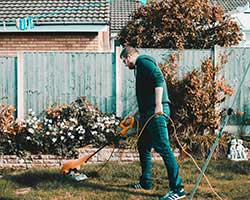The Dangers of Roundup Are a Big Concern for Middle Tennessee
May 16th, 2019 by Attorney John Colvin

Working outdoors, tending flowers and greenery, and breathing in fresh air all day long seems like a recipe for good health — right? Unfortunately, for modern-day nursery workers, landscapers, and even home gardeners, the use of pesticides and herbicides has become a fact of life. These chemicals do a great job keeping hungry insects at bay and helping our plants grow lush and beautiful, but at what cost?
One product that has become especially popular with professionals and hobbyists is Monsanto’s Roundup. This glyphosate-based herbicide is ruthlessly effective against weeds, but has been linked to numerous cancers. It’s also the focus of a growing number of lawsuits from people alleging their illness is the result of Roundup use.
In 2018, a San Francisco jury awarded a former groundskeeper with terminal non-Hodgkin’s lymphoma $289 million in damages in his lawsuit against Monsanto. (The plaintiff later agreed to a lower amount of $78 million.) In 2019, a federal jury awarded a cancer-stricken farmer in Sonoma County, CA, $80 million.
Tennessee’s cancer fatality rate is 13% higher than the national average. With Warren County’s McMinnville boasting over 300 nurseries and bearing the proud title “Nursery Capital of the World,” the area has a large number of workers at risk of heavy glyphosate exposure.
Monsanto Denies Dangers of Roundup
Despite being charged by the New York attorney general in 1996 for making deceptive claims, including that its product is “safer than salt” and “practically non-toxic,” Monsanto continues to maintain that Roundup is not harmful. After the San Francisco verdict, its parent company, Bayer, stated that “glyphosate-based herbicides have been used safely and successfully for over four decades.”
But evidence suggests otherwise. The Environmental Protection Agency (EPA) first noticed in the 1980s that a high number of farmers were being diagnosed with non-Hodgkin’s lymphoma. While in 2017 the EPA declared that glyphosate was “not likely” to cause cancer in humans, other organizations disagree.
- The World Health Organization’s International Agency for Research on Cancer has classified the chemical as a “probable human carcinogen.”
- In a 2019 review, scientists at the University of Washington found that agricultural workers who use glyphosate products regularly have a 41% higher chance of contracting non-Hodgkin’s lymphoma than other people.
- The non-Hodgkin’s rate for Americans overall is 2 in 100. For heavy users of glyphosate, the rate is 2.8 in 100 — still low, but a significant difference.
It should be noted that Roundup is not the only herbicide with glyphosate. Over 750 products containing the chemical are sold in the United States. It’s so widespread that its residue is in our water and food. A 2016 report found traces of glyphosate in the urine of 93% of people tested. No one knows the consequences, if any, of low-level exposure.
If You Work with Glyphosate, Protect Yourself
Whether you are a nursery worker, landscaper, farmer, or just someone who likes to keep your yard free of weeds, take a few precautions when working with glyphosate-based herbicides. Wear closed-toe shoes, rubber gloves, long pants, long-sleeved shirts, and goggles or safety glasses with side protection. Minimize inhalation of mist and fumes with a face mask. If you can, avoid the use of these products altogether. Old-fashioned elbow grease is just as effective at eliminating weeds!
If you think you or a family member has been harmed by glyphosate, call lawyer John R. Colvin for a free no obligation consultation. He is not afraid to stand up to the big agrichemical corporations and fight for your rights.
Disclaimer*
The information on this website is for general information purposes only. Nothing on this site should be taken as legal advise for any individual case or situation. This information is not intended to create, and receipt or viewing does not constitute, an attorney-client relationship. No representation is made that the quality of the legal services to be performed is greater than the quality of legal services performed by other lawyers.

